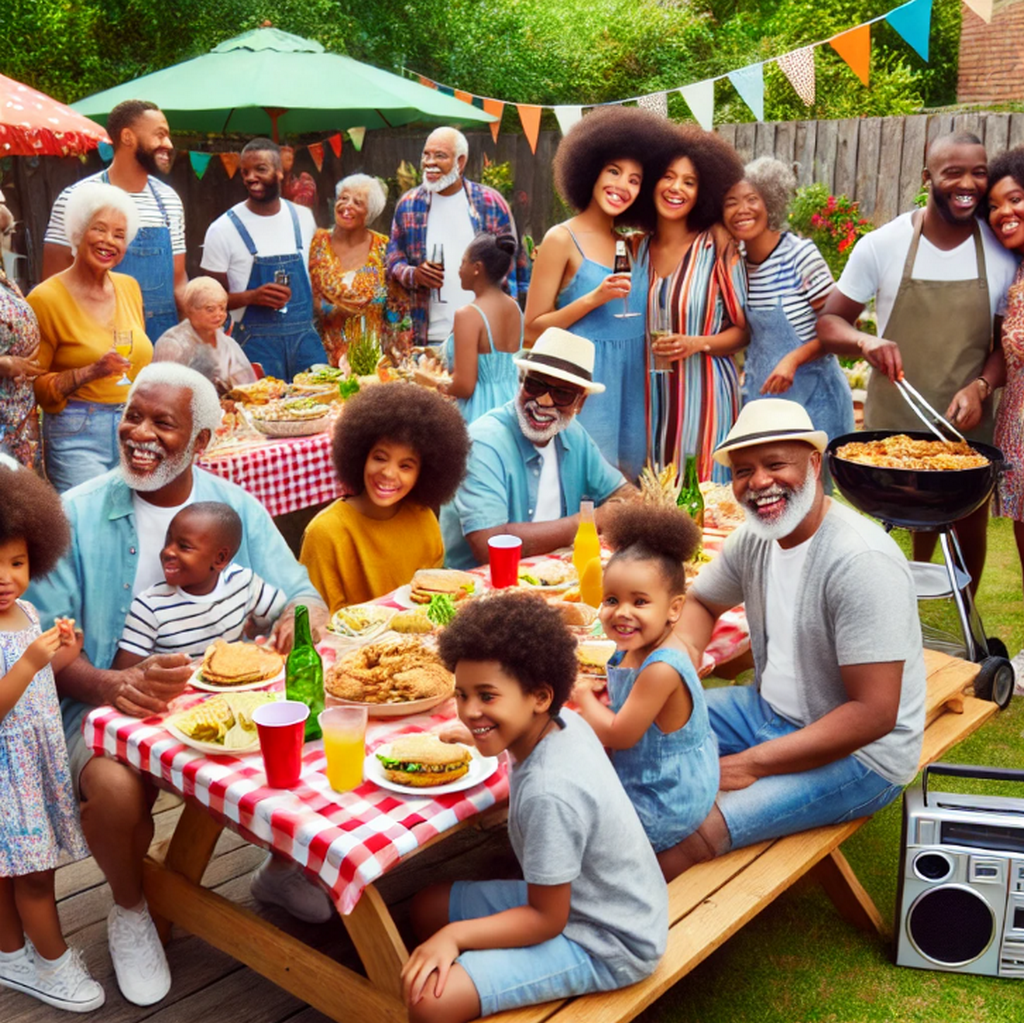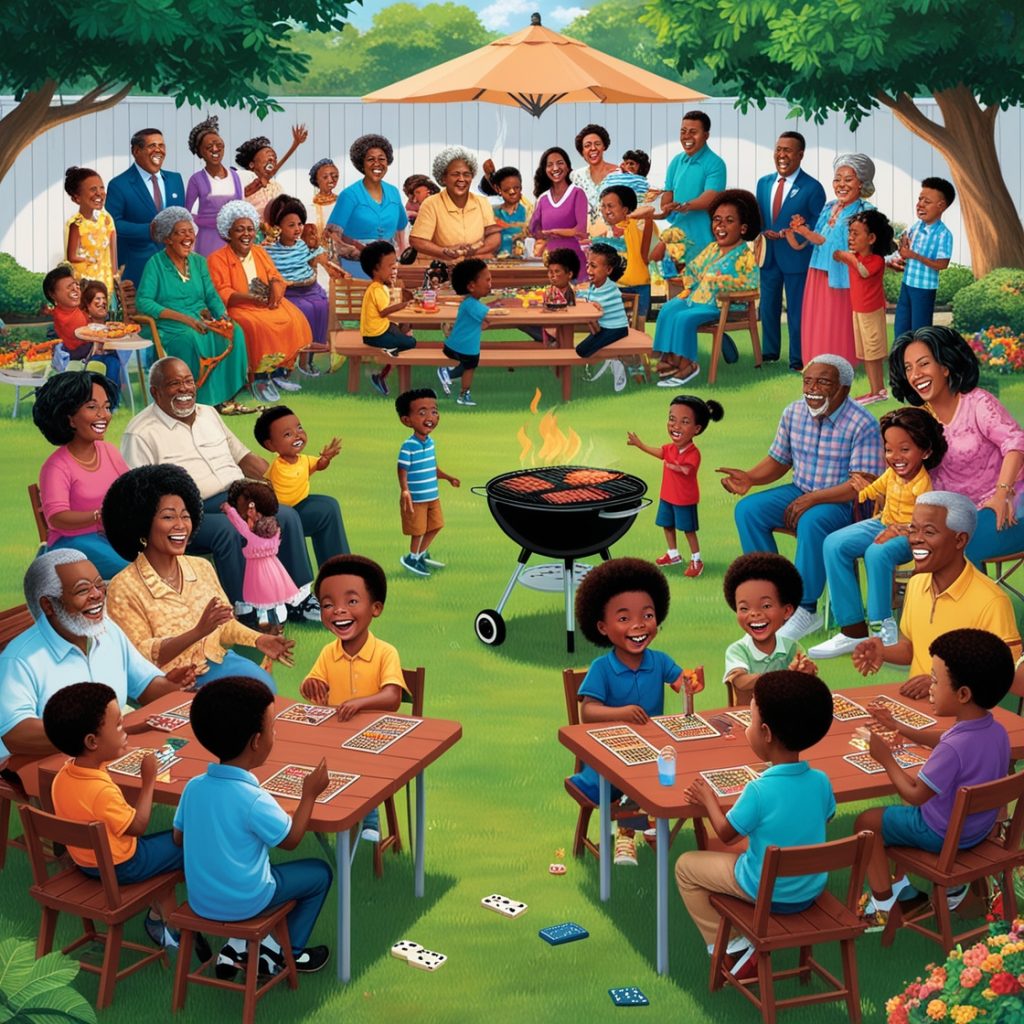Summary
Black families are built on strong family ties, which include deep respect for elders, the importance of family gatherings, collective child-rearing, and an emphasis on community. These connections aren’t just cultural they’re the glue that holds us together, offering emotional, financial, and practical support. By embracing these ties, we strengthen our resilience and ensure our cultural legacy continues.

Introduction
In Black communities, strong family ties are more than just a cultural norm; they’re the backbone of how we thrive and succeed. From tight-knit relationships to gatherings that turn into epic celebrations, family is central to our lives. Whether you’re from an African household, African American family, or part of the Black diaspora around the globe, the importance of these connections transcends borders and backgrounds. Let’s talk about the beauty of close-knit Black family structures, their importance, and how they shape who we are, starting with a look at strong family ties and what makes them so powerful.
What Are Strong Family Ties?
Strong family ties refer to the deep, enduring connections between family members, often characterized by love, respect, and mutual support. In Black cultures, this sense of unity often extends beyond the immediate family to include extended relatives, like grandparents, aunts, uncles, and cousins. These strong family ties act as a safety net, offering emotional, financial, and practical support to everyone in the family unit.
In our culture, family isn’t just a group of people related by blood. It’s an experience—a shared journey through life’s challenges and triumphs. Whether it’s a grandmother helping raise her grandchildren or cousins looking out for each other, these ties give us strength and resilience.
Classification of Strong Family Ties in Black Communities
To truly appreciate the importance of strong family ties, let’s break them down into key aspects:
- Respect for Elders: In many Black families, elders are seen as the bedrock of wisdom. From the advice they give to the traditions they pass down, we hold a deep reverence for those who came before us. It’s not uncommon to hear “go ask Grandma” or “What would Papa say?” in Black households, because we know their knowledge is invaluable.
- Family Gatherings and Reunions: If you’ve ever been to a Black family reunion, you know it’s not just a casual get-together—it’s a whole vibe. These gatherings bring the entire family together, often serving as a chance to reconnect, share stories, and just enjoy each other’s company. The laughter, the food (you know the potato salad is a must), and the games create memories that stay with us for a lifetime.
- Collective Responsibility for Child-Rearing: One of the beautiful things about Black families is the concept of “it takes a village.” Parents aren’t raising their kids alone. Aunties, uncles, grandparents—everyone chips in to make sure the children are cared for. This shared responsibility fosters a sense of community and security for the younger generation.
- Family and Communities: In Black culture, family often extends into the community. Neighbors become like family members, and you’ll often hear someone say, “That’s my play auntie” or “That’s my second cousin,” even if no blood relation exists. It’s a testament to how deep our sense of connection runs.
Example of Strong Family Ties in Action
Let me paint a picture: Every summer, my extended family gathers at my grandmother’s house for a weekend reunion. Imagine the smell of BBQ in the air, kids running around the yard, while the elders sit in lawn chairs, trading stories about “back in the day.” My cousins and I play spades under a tree while my aunties argue over who makes the best peach cobbler. The sense of belonging is so thick, you can almost taste it—this is what strong family ties look like in practice.
FAQs About Strong Family Ties in Black Families
- Why are elders so highly respected in Black families?
Elders hold the history of our families. They are the ones who have lived through struggles, victories, and lessons that we can learn from. Respecting them means honoring our past and ensuring our traditions live on. - Why are family reunions so important?
Family reunions aren’t just a chance to eat good food (though that’s definitely a perk). They’re about connection. They allow us to reconnect with relatives, pass down family history, and create memories that strengthen our family bonds. - What does “it takes a village” really mean?
It means raising children is a shared responsibility. Parents don’t do it alone—extended family members, friends, and community members all play a part in guiding, nurturing, and supporting children as they grow.

Cause and Effect: The Impact of Strong Family Ties
Strong family ties in Black communities offer countless benefits. These bonds create a support system that helps people weather life’s storms. Studies show that strong family connections lead to better mental health, a stronger sense of identity, and resilience in the face of adversity. When you know your family has your back, you can face the world with confidence.
On the flip side, when family ties are weak or strained, it can lead to feelings of isolation and disconnection. The absence of a supportive family unit often leaves individuals more vulnerable to external stress and challenges.
Comparison: African Families, African American Families, and Black Families Globally
Let’s compare African families, African American families, and Black families worldwide when it comes to strong family ties.
- African Families: African families, particularly in more traditional settings, tend to have very large extended families. Elders are not only respected but revered, and child-rearing is a collective effort, often including extended relatives and even close family friends.
- African American Families: In African American families, the concept of strong family ties often developed as a way to survive the traumas of slavery and segregation. Family became a refuge—a place to feel seen, loved, and protected. Reunions and gatherings often serve as emotional touchstones.
- Black Families Globally: Black families around the world share similar values around family, even if the specific traditions differ. From the Caribbean to Europe, you’ll find Black families that prioritize collective support, respect for elders, and a focus on community.
List of Key Benefits of Strong Family Ties
- Emotional support during tough times
- Shared responsibility for childcare
- Strong sense of identity and belonging
- The passing down of cultural traditions and wisdom
- Increased resilience in the face of adversity
Sequence of How Strong Family Ties Build Over Time
- Foundation: Begins with respect for elders and understanding the importance of family.
- Growth: Through collective child-rearing and shared responsibilities.
- Strengthening: Cemented through regular family gatherings and reunions.
- Legacy: Passed down through generations, ensuring strong family ties continue.
Conclusion
Strong family ties are a hallmark of Black communities, and they shape us in ways we sometimes overlook. Whether it’s respecting our elders, coming together for epic family reunions, or raising children collectively, these bonds make us who we are. And as we continue to pass down these traditions, we ensure that our sense of family stays strong for generations to come.


